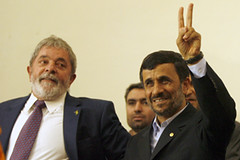
Presidents Lula da Silva of Brazil and Mahmoud Ahmadinejad of Iran reached an agreement on lessening tensions between the U.S. and the Islamic Republic of Iran. The proposal was rejected outright by the U.S.
Originally uploaded by Pan-African News Wire File Photos
19:37 Mecca time, 16:37 GMT
Iran admits sanctions could bite
Ahmadinejad had earlier dismissed the US sanctions as "pathetic"
A senior Iranian official has acknowledged for the first time that sanctions against the country could slow down its nuclear programme.
Ali Akbar Salehi, the head of Iran's atomic energy agency, told the ISNA news agency on Wednesday that the sanctions could have some impact.
"Maybe they will slow down the work but they will not stop it, that's certain," Salehi said.
Mahmoud Ahmadinejad, the Iranian president, previously said that a new wave of sanctions imposed by the United Nations, the US and the European Union would have no impact on Iran's economy or its nuclear programme.
He called the US sanctions "pathetic" and said that the UN resolution was worth no more than a "used handkerchief".
Tough sanctions
Barack Obama, the US president, had signed into law earlier this month far-reaching US sanctions aimed at squeezing Iran's refined petroleum imports.
The UN sanctions adopted in June, among other measures, expanded an arms embargo against Tehran and called for new measures against Iranian banks with suspected connections to the country's nuclear or missile programmes.
Obama had called the sanctions Washington's toughest ever, "striking at the heart of the Iranian government's ability to fund and develop its nuclear programmes".
Salehi said that Iran's Bushehr nuclear power station would come on stream by the end of the summer. He said the plant would not be affected by the sanctions, but Iran's more controversial uranium enrichment programme might be.
"In the case of enrichment and for some equipment like equipment for measuring, we might have some problems," Salehi said.
But he added that Iran would be able to produce that equipment itself if necessary.
Iran has said it is prepared to return to talks with world powers on its nuclear programme, to discuss a fuel swap deal that was negotiated by Brazil and Turkey.
Under the deal, Iran would send some of its low-enriched uranium abroad in return for purer material, enriched to 20 per cent, that it needs for a medical research reactor.
Salehi said that Iran would continue enriching uranium to 20 per cent, an activity which particularly concerns the West as it is a significant step towards making weapons-grade material.
He said Iran, which says its programme is for generating electricity, had the right to enrich even further.
Iran rejects Western claims that it is seeking to build a nuclear bomb.
"We will not produce 20 per cent enriched uranium more than our needs, but we reserve the right to enrich to whatever level of enrichment for use in peaceful ways," Salehi said.
Source: Agencies
No comments:
Post a Comment